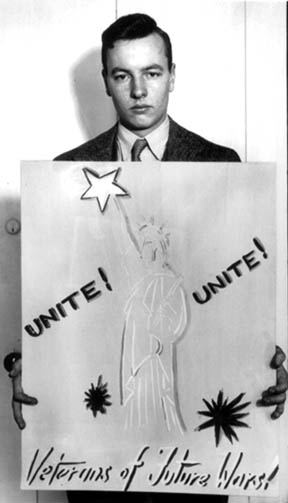|
Web Exclusives:
Under the Ivy September
11 , 2002:
Last March, when I was still in my capacity as editor of PAW, I received a letter from John Stutesman '42, once the editor of Malcolm Forbes '41's campus newspaper The Sovereign. PAW had run an article on the short-lived Sovereign a couple of years ago, so his letter caught my attention, as did his topic: the Veterans of Future Wars. Stutesman had written an article on the VFW for the April 1941 issue of the paper, a copy of which he enclosed. In his letter to me, he explained that the VFW, "the greatest anti-war joke of the last century," had been created in the fall of 1936 — a time of political uncertainty, threatening war, and economic depression not so far removed from the climate of today. The main demand of the VFW — published in a mock "Manifesto" in the Daily Princetonian of March 14, 1936 — was for bonuses of $1,000 to be paid immediately to men of military age (18-36), in recognition of the sacrifices they would surely be called upon to make. (The students were responding to the recent authorization by Congress of the payment of a bonus to veterans of World War I — as Stutesman wrote, "to the soldiers who had so patriotically allowed themselves to be drafted.") Not satisfied with a limited campus audience for their prank, ringleader Lewis Gorin '36 raced to Vassar to set up a female auxiliary, a report of which was duly noted in the next Prince, and cohenchmen Pete Rushton '36 and Bob Barnes '37 sent a crafty story to the Associated Press. The nation took note when reporters followed up with an interview with the National Commander of the Veterans of Foreign Wars, the real thing. In what turned out to be an error in judgment, the man took the issue seriously, calling the Princeton students "insolent puppies who should be spanked" and saying that "they are too yellow to go to war." The nationwide audience, enjoying the satiric prank, only solidified behind the new VFW. The students went all out, renting an office over the Balt, holding a campus rally, devising a salute, instituting the "Home Fire Division" (after the "Future Gold Star Mothers" was protested as sexist), and finally, actually incorporating with the full, if unknowing, approval of the State of New Jersey. The true genius of the conspirators, however, revealed itself after the hoax was well underway. The students refused, at any time, to admit that their group was a joke, or that their demand for a prepaid bonus was anything but just and fair. Reporters looking for a laugh came away scratching their heads. The chair of Congress's House Rules Committee looked foolish when a senior approached him in front of reporters about becoming a lobbyist for his cause. An American Legion Post trying to humor the lads by inviting them to an open house got this telegraphed reply: "Appreciate kind invitation STOP ... Unfortunately pressure of real business prevents acceptance of any purely social engagements STOP When we get our bonus we can play too." Like so many campus movements, the Veterans of Future Wars came to a halting stop when its leaders graduated. As Stutesman wrote in 1941, at Reunions in June 1937, "a solemn meeting of the original National Council legally interred the VFW with the aid of a notary public, thus ending a movement which started as a joke, became a national satire, ...was probably the most ironic commentary on postwar expenses ever engineered, and was certainly Princeton's most notable gift to the energetic happiness of the nation." Sixty-one years later, when Stutesman came across the old article, he added this bit of perspective: "The request of the Veterans of Future Wars for bonuses now was humor of a high style, and like all great jokes it had a bitter end. Those young men who foresaw a war and knew they would be fodder were, in fact, bundled off to war, and many did not survive." Their spoof did, and continues as one of Princeon's best-known
and fondly remembered jokes.
Jane Martin ’89 is PAW's former editor-in-chief. You can reach her at paw@princeton.edu
|
|||

